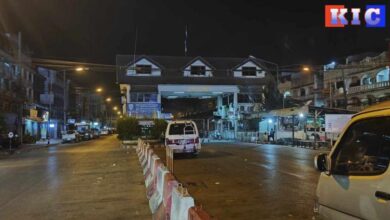Burma’s Proposed Religion Laws Fuel “Intolerance and Hatred”

Human rights experts and religious leaders have warned that Burma’s proposed religion laws, regarding conversion and inter-religious marriage, violate fundamental human rights and will further fuel “intolerance and hatred” against the country’s ethnic and religious minorities.
Two proposed laws that have been granted endorsement from Burma’s president, represent a direct threat to the country’s ethnic and religious minorities, human rights experts and religious leaders have warned in interviews with Karen News.
The inter-faith marriage law and the religion conversion law place tight restrictions on a citizens’ right to convert outside of their religion or to marry someone who is not of the same faith.
President U Thein Sein and the speaker of the national assembly, Thura Shwe Mann, have already officially endorsed the draft laws and instructed government ministries to ratify them following a process of ‘public consideration’ before presenting the legislation to the lower house of parliament.
In an interview with Karen News, Benedict Rodgers, Christian Solidarity Worldwide’s representative for East Asia, said that the proposed laws would “further fuel intolerance and hatred,” and contribute to intra-ethnic conflict
Mr. Rodgers noted that the laws represented a “direct and serious violation” of human rights.
“These proposed laws, on conversion and inter-religious marriage, represent a direct and serious violation of human rights. Freedom of religion or belief, as set out in Article 18 of the Universal Declaration of Human Rights, is one of the most fundamental rights of all. So too is the freedom to choose who to marry,” he said, adding, “No one should be told who they can and can’t marry, or what they can and can’t believe, and so if introduced, these laws would violate basic human rights.”
Mr. Rodgers maintained that “all the evidence” pointed to President U Thein Sein’s government legitimizing discrimination against minorities and that the proposed laws were a direct threat to the country’s minorities.
“The government’s repeated failure to prevent violence, to protect vulnerable communities, or to intervene swiftly to stop violence; its repeated failure to bring the perpetrators of violence to justice; the repeated failure to tackle hate speech; and these new proposed laws have all made the situation for minorities worse.”
The inter-faith marriage law makes it illegal for a Buddhist woman to marry a non-Buddhist partner unless the man converts to Buddhism before marriage. Violation of this proposed law could lead to a 10-year prison sentence and confiscation of personal property.
The religion conversion law requires that citizens who plan to change religion must first be processed through an exhaustive series of official ‘permissions’ from government departments – including the Ministries of Religion, Education, Immigration and Population, and Women’s Affairs. Under the law, proselytizing, forcing someone to convert, or insulting another religion could lead to a 1-year prison sentence.
Physicians for Human Rights outlined to Karen News why the proposed laws were an attack on human rights.
“The legislation represents an attack on the fundamental human right of freedom of expression… governments have no business regulating such a personal right, and this legislation in particular will have a disproportionately harmful impact on religious minorities in Burma,” Andrea Gittleman, a spokesperson from PHR said. “The religious conversion legislation is one more way for the government of Burma to codify discrimination against religious minorities.”
Ms Gittleman said that Burma’s reform process could not go forward while minority groups had their rights undermined and that reports of opponents to the legislation receiving threats to their life were “chilling.”
“Burmese leaders should know that any political reforms or improvements cannot truly take hold when minority groups remain saddled with illegal restrictions and an inability to access their basic rights,” Ms Gittleman said, adding, “The promulgation of legislation that tramples basic human rights is a troubling development that may indicate that entrenched discrimination and violence against minorities may not end soon. Opponents of this legislation report receiving threats, which sends a chilling message to all those who want the Burmese parliament to protect the rights of all people in Burma.”
Saw Kalu Hser, 41, a Christian minister from Toungoo District, Burma, and now working with the cross-border community in Mae Sot, expressed grave concern that the laws targeted religious minorities.
“Discriminatory laws like this are about sowing hatred and protecting the domination of one group. We Karen have been persecuted for decades. There is a lot of tension in Burma already right now and laws like these adds to these tensions. It could lead to riots and clashes and encourage hatred,” he said, in an interview with Karen News, “The government are creating this tension in the community because they want to preserve their power.”
Saw Kalu said he was scared to go back to Burma as a Christian minister.
“Everyone should have access to different voices but the reality on the ground for us is that if we follow Jesus [Christ] then there is a possibility that we will be persecuted,” Saw Kalu argued that the military-backed government were pushing through the laws to ensure the continued role of the Burma Military in ‘domestic security:’ “By creating tension they create the argument that they are necessary for the country [the Burma military].”
Saw Kalu urged the international community to pressure Burma’s government to drop the proposed laws. “[Lifting of] Sanctions have opened Burma up, but it is not fair for the international community to support men, including the President and leader of Parliament, who actively encourage division and disunity in Burma.”




